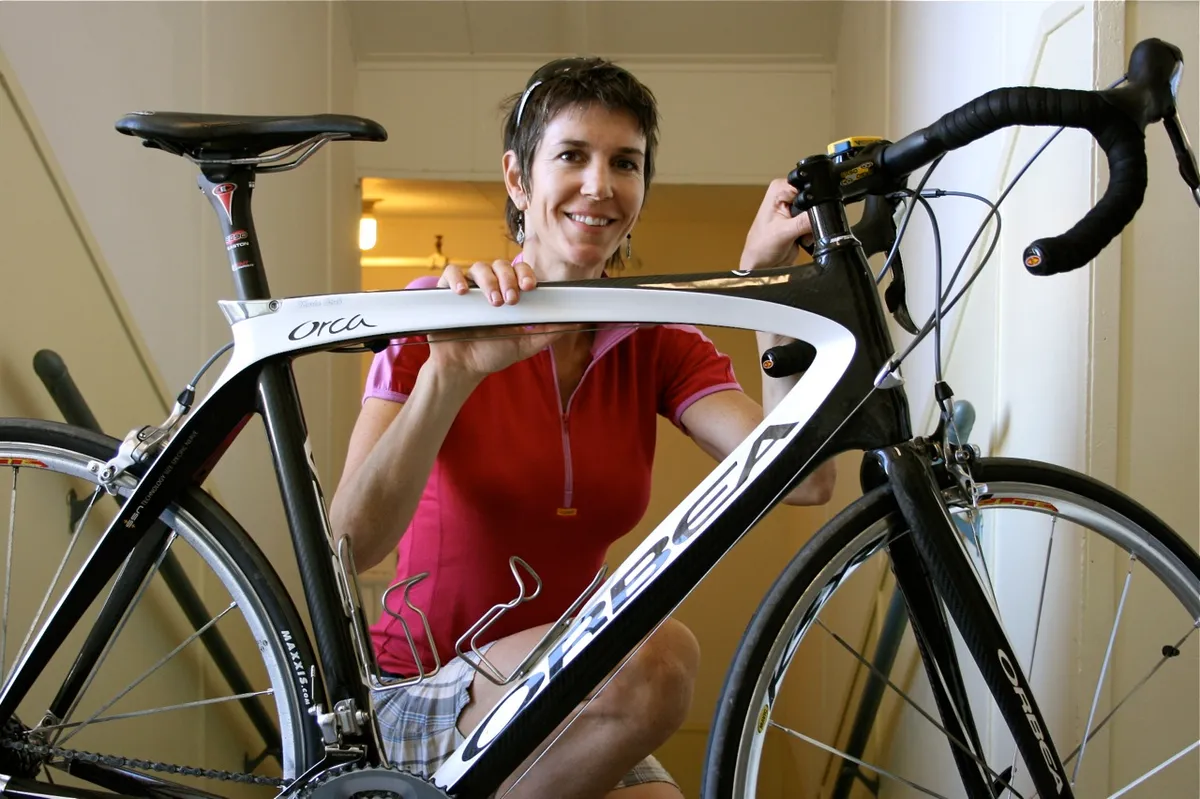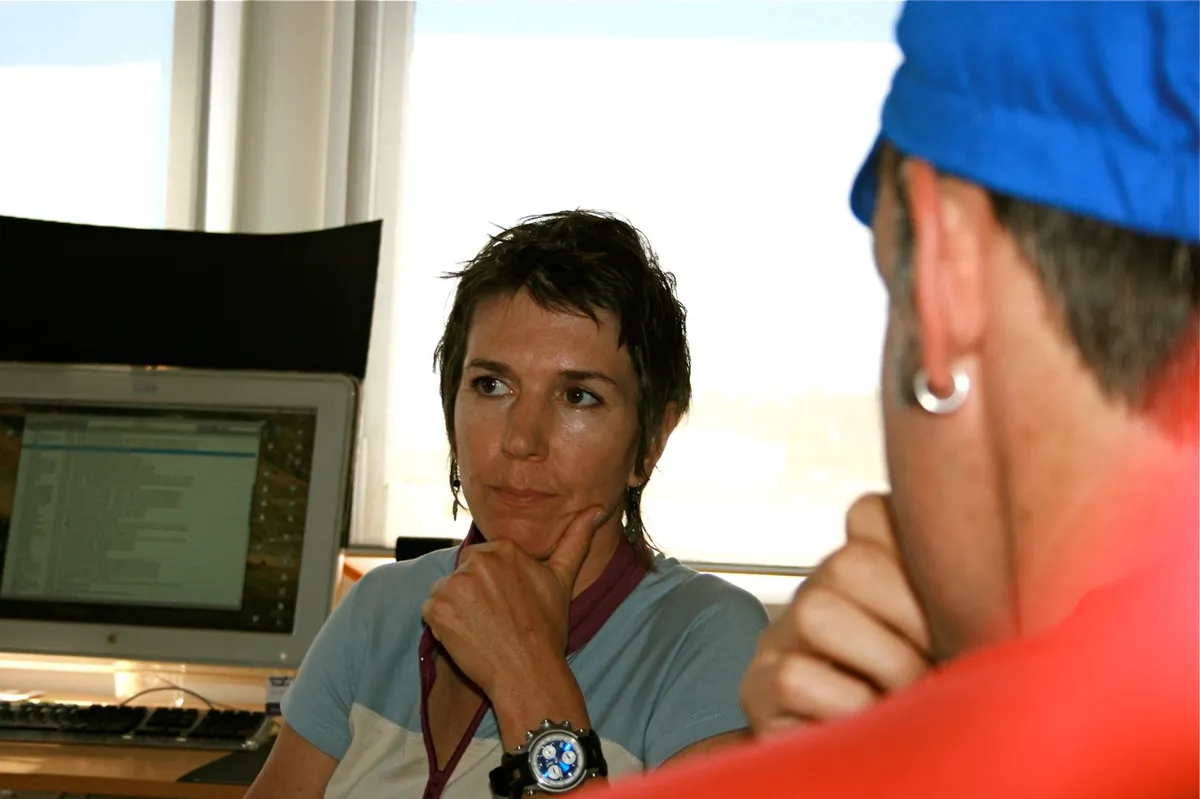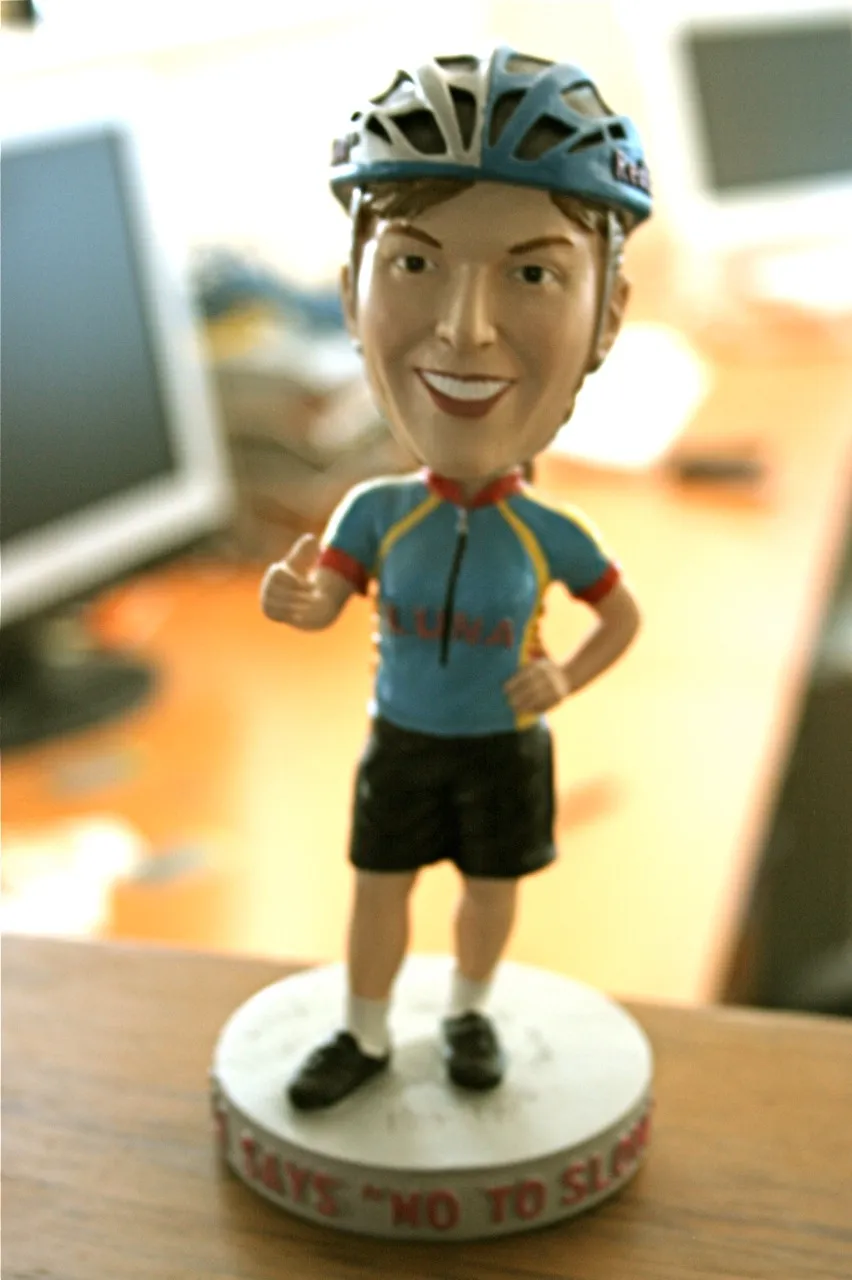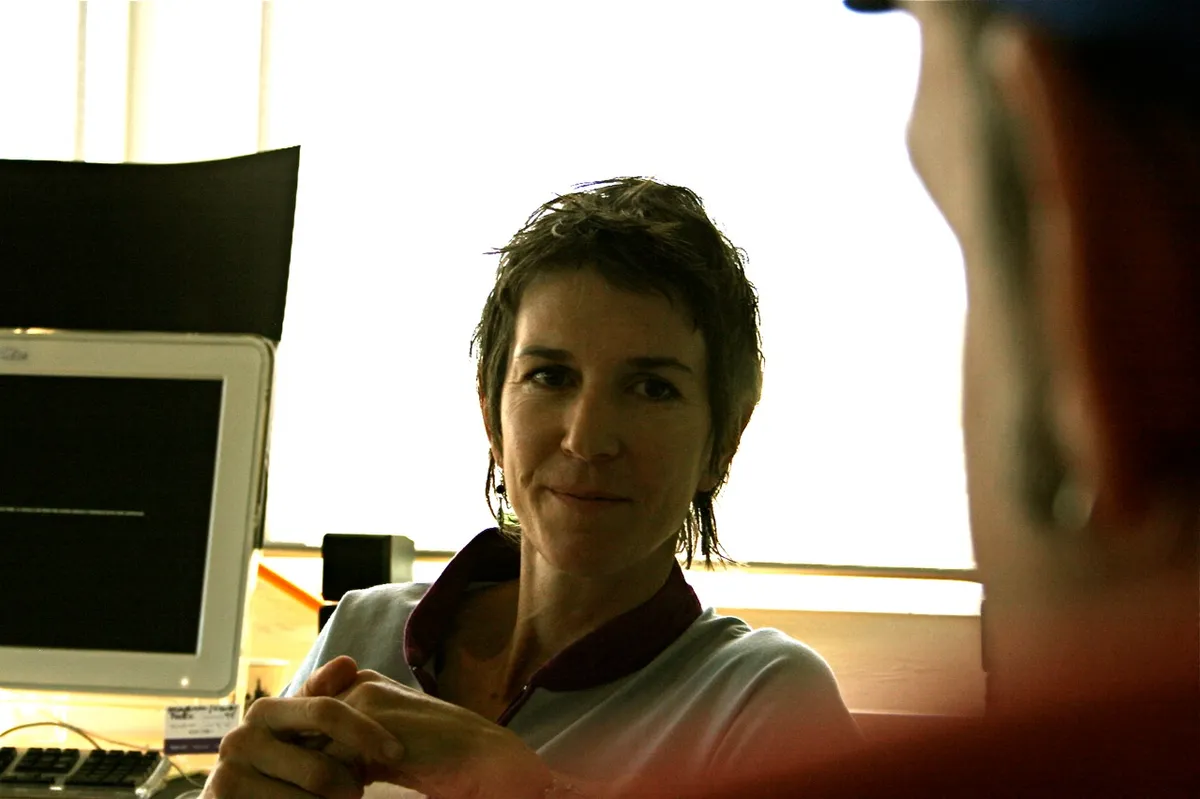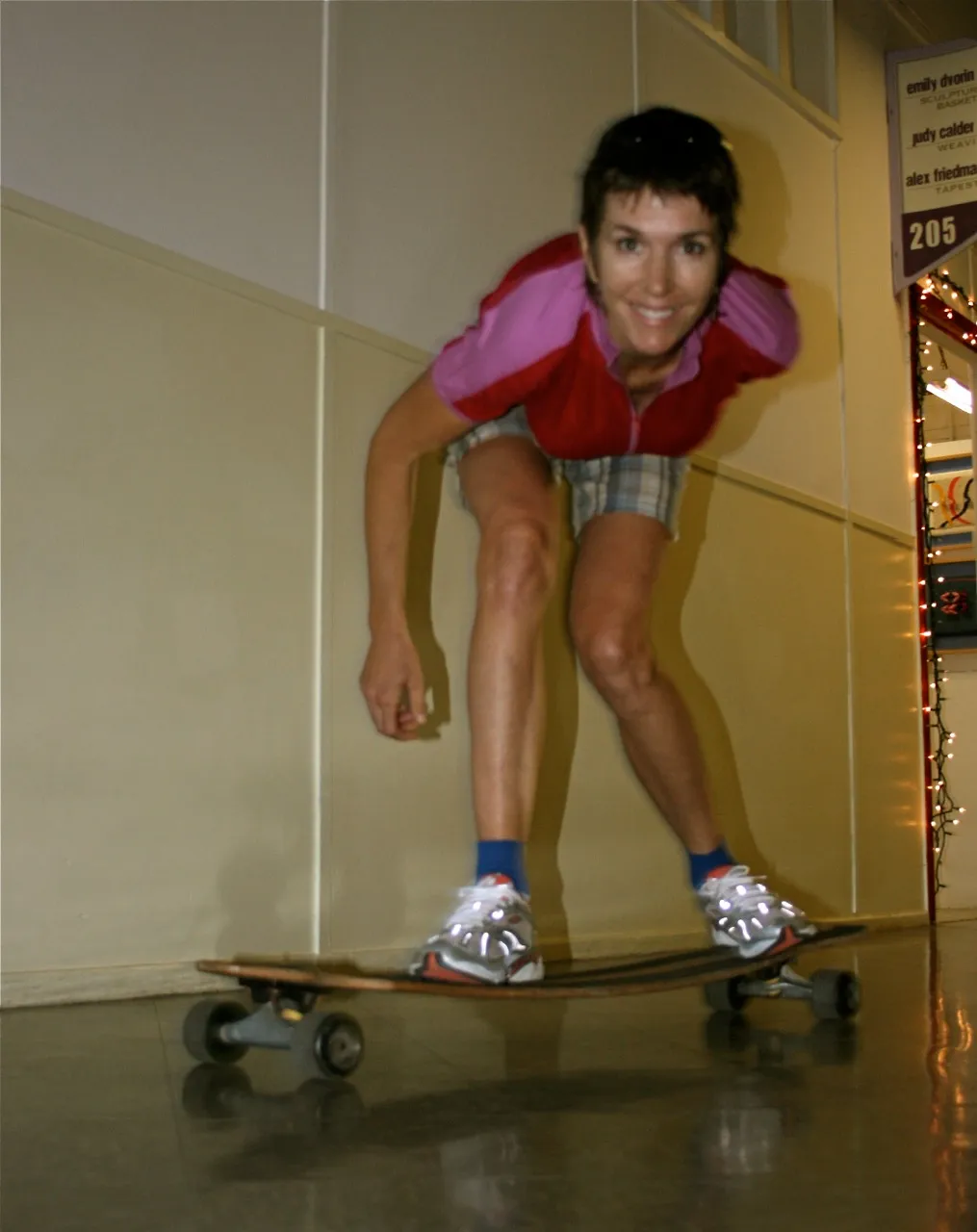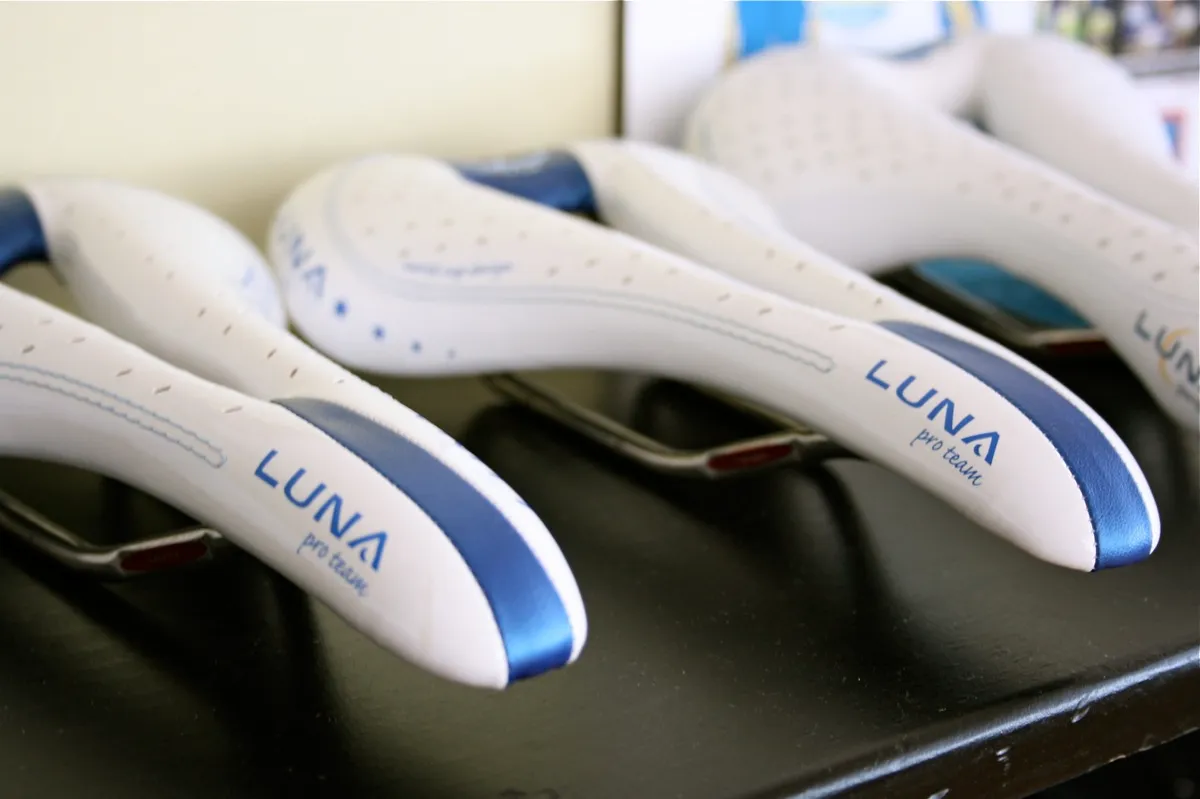Former downhill racer Marla Streb may have advanced degrees in molecular biology, but the recently retired mother of two young girls considers her racing career as the equivalent of getting a PhD in adrenaline.
Streb, 44, and her husband Mark Fitzgerald spent the past few years trying to develop sustainable multi-user trail parks in Costa Rica, building on her 16 years as a professional racer. They recently moved back to Sausalito, California where she has taken on a new role as Team Luna Chix spokesperson and Luna Sport Gear evangelist.
"I've always been interested in marketing in general, so this job is a good fit," she explained when BikeRadar visited her new office in Sausalito. "I've been positioning myself for this role over the past few years. I raced as time allowed, being based in Costa Rica. I missed the cycling community. We have some great momentum with Luna as a company, and are looking forward to launching the Luna Sport Gear line at Interbike."
As one of the first pro racers with Luna in 2002, Streb is excited to see the company and team evolve, mature and expand. When she first began flying the Luna colours on race courses around the world, there were just five Luna ambassadors; that number has grown to more than 250 all over the US, including runners, triathletes and mountain bikers.
Streb also inherits a successful race team to promote: already in the first part of the 2009 season, the Luna pro team has two World Cup victories and has got on the podium at nearly every race. Katerina Nash won the recent Downieville Classic, and Georgia Gould is hitting her stride, winning the elite women's short track race at the national championships.
"Katerina, Alison (Dunlap) and Georgia will be racing the cyclo-cross circuit as a team, and our multi-sport athletes are doing quite well," Streb said. "We've branched out into XTERRA (the off-road triathlon series), with some road racing. we plan to grow the results from there."
Luna Gear: 'Designed from the breasts down'
Another aspect of Streb's new role with the Luna brand is working with the media, pro team and ambassadors to tell the world about the new line of women's performance clothing.
"The theme is maintaining our authenticity, using recycled materials wherever possible while still presenting a unique fit aimed at active women," Streb said. "Even our packaging is minimal, while keeping things consistent with our Luna goals inherited from our parent company, ClifBar.
"We're doing our best to make good, comfortable clothing for women like me who aren't interested in printed white fabric with butterflies. We create tasteful designs with colour blocking integrated into the garments. Our prints are from 200-year-old Asian wood blocks, from a local artist.
"I like to refer to this process as 'designed from the breast down' versus the old saying 'from the ground up'. We don't subscribe to the 'shrink it and pink it' mentality so prevalent in the bike industry.
We hired some fashionista designers and pattern makers – all women – to take this to the production level once we've received feedback from the Luna racers. We don't want any of our garments to constrict at the arms, wrists or waist or thigh, so we distribute the pressure out by using wider elastic. Comfort is the key for active women."
According to Streb, Luna has a big pool of women to test its clothing, including some of its ambassadors. "We get awesome feedback from our annual Luna summit participants before Sea Otter," she said. "Our initial focus with the clothing line will be for the cyclist, which has been our cornerstone. Once we're rolling, we'll branch out into the other garments needed for the other disciplines our Luna racers and ambassadors participate in.
"Luna has enjoyed a positive soft opening for the Luna gear, producing small production runs that have sold out through some regional dealers in the past season. They've also been getting some specific product input from the retail level, which is key for a new line."
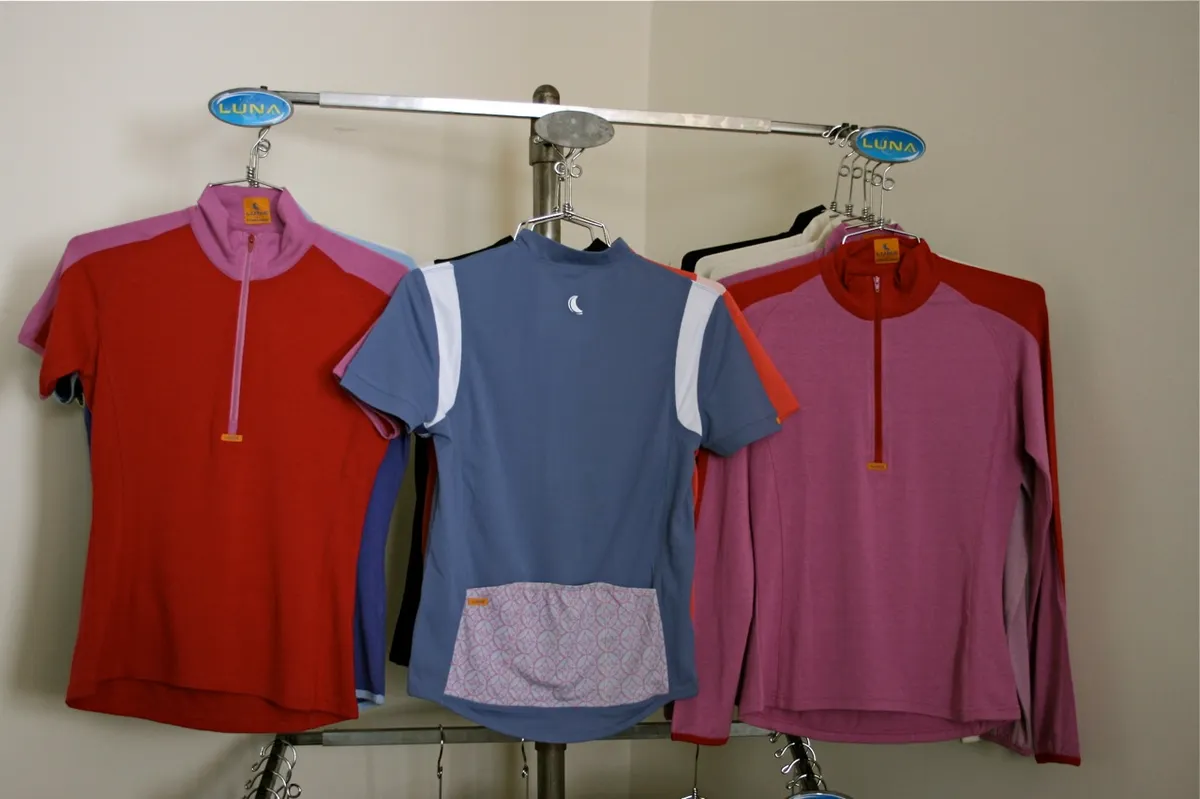
Some 2010 Luna Gear samples
Career highlights
Streb was X-Games mountain bike champion in 1999, three-time national downhill champion, two-time singlespeed world champion (she has the winner's tattoos to prove it) and a World Cup winner.
All this from an athlete who spent 18 years as a classically-trained pianist, worked as an AIDS researcher at the renowned Scripps Research Institute, had a brief stint as a bike messenger (don't ask, she'll say) and tried her hand at BMX, cyclo-cross, road and motorcycle racing (her forte was the hare scramble, a discipline made famous by southern California motorcycle legend Malcolm Smith and actor Steve McQueen in the 1970 documentary On Any Sunday).
To hear Streb tell it, life as the fourth of five and the only girl in the family growing up in Baltimore was her first proving ground. "Growing up with four brothers who didn't seem to want me around gave me my persistent way," she said. "There weren't any other girls in the neighbourhood, so they were stuck with me. We go-carted, skateboarded, jumped from tree to tree, all kinds of crazy stuff; it's ironic that I became the only extreme athlete in the family."
The 5ft 10in Streb knew that the great outdoors was calling her name, even as a well-paid AIDS researcher in San Diego in the early 1990s. She enjoyed the lab work her job required, but struggled with the animal testing that was part and parcel of searching for an AIDS cure.
"I didn't care much for the animal testing; my bike riding was taking care of the angst I felt and had nightmares over from my work at Scripps," she said. "Injecting monkeys with phosphate-buffered saline and watching them die was tough.
"I enjoyed the lab work, because my background was in micro biology and pathology at the University of Maryland. I have an undergrad degree in marine biology, but AIDS work was where the money was. The job also allowed me to come and go as I pleased, which I liked."
Streb was commuting by bike to work at Scripps, and became fit in the process. Mountain biking was taking off, especially in southern California, and she had an understanding boss who let her take long rides during work. Along the way, someone recommended racing.
"I strapped my bike on the back of my motorcycle and headed to a cross-country race in Big Bear the following weekend, which I won," Streb said. "It was just the beginner's category but I was hooked. I've always had an affinity for danger, so I was drawn to downhilling soon after. I viewed it as a legal way to get that adrenaline fix.
"The next weekend I raced the downhill in my farmer red pajamas because it was so cold. I won that race as well. It was a blast; I literally climbed the mountain and felt like I was accomplishing something!"
Within a year she turned pro and quit her job at Scripps."I drove my polka-dot VW bus with the cow horns on the front to meet with Iron Horse; because I wasn't a natural at racing, I felt I needed some kind of hook to sell myself," she said.
"The popular racer at the time was Missy Giove, and she had this 'dead piranha thing'. Mine was being this over-educated girl from next door who plays guitar and lives in a VW bus... actually, I don't remember what my hook was! I made the guys at Iron Horse sign me by promising to beat Missy. The best relationships come from face time, I think."
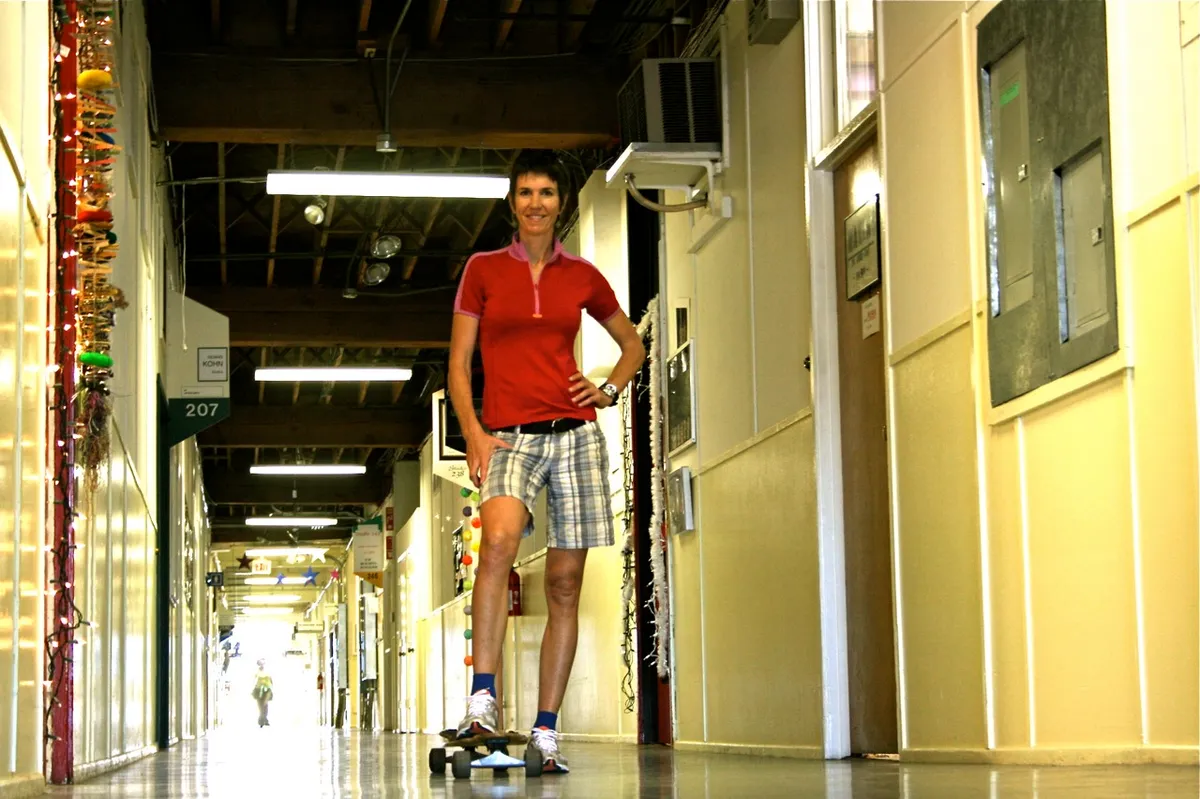
The always-adventurous Streb outside her Sausalito office
On to Marin
Even though her passion was racing downhill, Streb was signed to race cross-country for Iron Horse, back in the days when the National Off-Road Biking Association (NORBA) was in full throttle and American racers like Juli Furtado, John Tomac and Ned Overend were puling down big contracts and getting big results on the world stage.
Her next stop was racing for Marin, based in the fertile mountain biking grounds of northern California. She was also able to become a bonafide downhiller with the Novato company.
Oakley sports marketer Steve Blick met Streb on the NORBA circuit, and on her advice got a job at Marin Bikes, where he went on to run the World Cup team. He has fond memories of their time together.
"One of the things I cherish was our daily ride, starting in Fairfax and spending most of the daylight hours riding everything imaginable in Marin," he said. "Most of the time we would get lost and laugh until we bonked, then laugh some more. Those were super-great rides; now that she has returned, I have a great reason to head back to Marin."
Streb earned enough cash during her Marin days to buy a house in San Geronimo, northwest of Fairfax – but only after she agreed to run into a tree repeatedly.
"I was asked to do a television commercial for the V02 Max bar, made by the Mars company," she explained. "Everybody hated that commercial, but I was able to buy a house with the money made from that commercial! You can't argue with that; I'm not too proud!"
Racing multiple disciplines for most of her career, Streb was obsessive with training. Having a science background prompted her to use a logbook, keeping a meticulous journal of everything: resting heart rate, hours trained, miles ridden, hours ridden. She timed and memorised all her downhill runs on Mount Tamalpais, which loomed large over her training grounds.
She says she was doing this because of her lack of skill and co-ordination. She even had a start gate in her front yard to help her practice; anything to help her go faster. She rode with 12-year-old boys, doing whatever it took to gain speed.
The Yeti years
Streb also did plenty to get noticed in the early 2000s, including a nude (but not revealing) photo shoot for Outside magazine when she raced for Yeti Cycles. She was showing off her singlespeed world champion tattoo, she said.
"When Volant Sports bought Yeti from Schwinn, we decided it was very important to grow in our race programme and Marla was a key part of our early strategy," Yeti general manager Chris Conroy told BikeRadar.
"She is very professional and was great to have on our team. Probably the biggest non-racing highlight when she rode for us was her appearance on (the television news programme) Dateline NBC. That was huge for her, the Yeti brand and the industry as a whole. There aren't many racers that could have pulled that off."
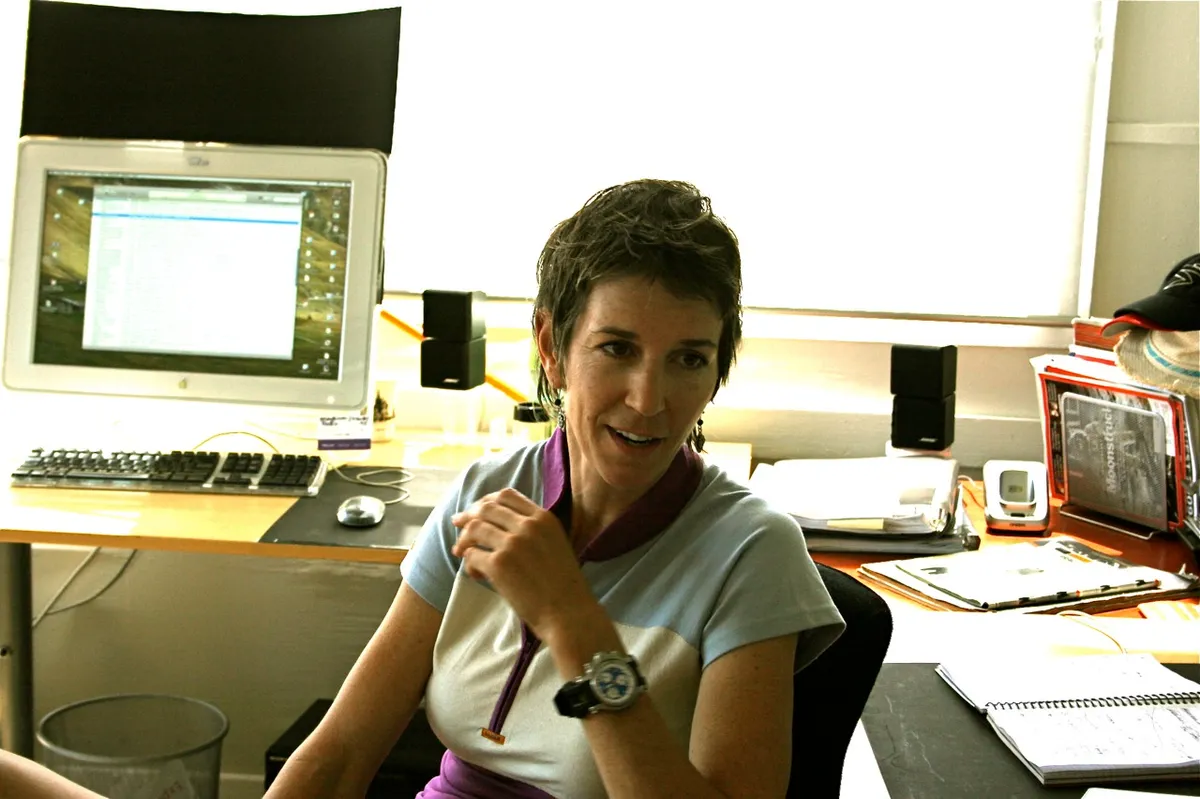
Luna is launched
ClifBar founder Gary Erickson realised his young daughter was like most active girls: talented but with limited options in the bicycle racing scene. He and his wife Kit conceived the Luna women's cycling team in 2001, and launched with Streb, Alison Dunlap and three others.
Early Luna team bike sponsor Rob Roskopp of Santa Cruz Bicycles remembers it fondly."I believe Juli (Furtado, Santa Cruz's sponsorship co-ordinator and former racer) heard something about ClifBar forming an all-women's team," Roskopp told BikeRadar. "Then we met with (Luna Chix general manager) Dave McLaughlin. He explained the whole concept and it sounded like a great deal to be involved with.
"I met Gary Erickson at Interbike and we hit it off and sponsored the Luna Chix for the next four years. It was the first big team Santa Cruz was involved with, so we were very excited about the possibilites, especially with such great people and an incredible company behind them."
Streb was flying the Santa Cruz colours when she won a downhill World Cup in 2003.
"Marla is one of the incredible ones, that's for sure!" Roskopp added. "She's very charasmatic; people sincerely enjoy being around her. She's done a lot for the sport, too. I wish there were more women like her today."
The team now ride Orbeas, primarily for the extended product offerings like time trial, cyclo-cross and road bikes for the multi-sport athletes, something Santa Cruz don't offer. Luna ambassadors still work with Santa Cruz, though.
Costa Rica
After racing her bike all over the world, Streb discovered Costa Rica after racing the infamous La Ruta de los Conquistadores in 2003. She and Fitzgerald – avid sailors who own a 52ft boat called Indifference – decided to sell their San Geronimo home and move to Costa Rica two years later.
"La Ruta, which as you know is a brutal race surrounded by extreme beauty, was exotic, adventurous and disorganised," she said with a chuckle. "I've never been scared like I was when trying to cross an elevated railroad track. Absolutely treacherous. The last time I did the race a train was coming in the opposite direction!
"We sold our home in San Geronimo at the peak in the market and got lucky; we took our money and bought a place in Costa Rica as a way to get away from it all for a while, really. I love the people, animals, diversity, and the lack of singletrack caught our attention. They don't build trails that are sustainable."
The original idea was for Streb and Fitzgerald to become singletrack trail building consultants for outside developers interested in creating outdoor adventures that included mountain biking. But things didn't go to plan.
"Tourism in Costa Rica died when our global economy died; everything was put on hold for us there," she said. "I've spent the past eight years racing with Luna, and once we realised our Costa Rica experiment wasn't shaking out as planned, I started hounding the Luna folks about my taking on a new role with either the team or the ambassador groups. My new role is really a soft landing, a no-brainer to come back to northern California."
Streb and Fitzgerald are negotiating with several developers in Costa Rica now, because the resort they were originally working with lost its lease. They've put the Costa Rica project on hold and are focusing on some US projects.
Streb's multi-tasking, can-do attitude belies her calm demeanor. She usually wakes up each day at 4am to get busy doing something: cleaning, reading or working. She relies on Fitzgerald to be an at-home dad with the girls while she transitions into her new role with Luna.
"I have plenty of flexibility here," she said. "We live locally; it's just a four-minute ride on the Orbea to get here every day. I think my little girls will be inspired as they grow up. They'll have a positive relationship with Luna and relate to its values as I have these past several years. Several Luna ambassadors are moms."
Indeed, but how many are looking for a new four-stroke motorcycle like Streb?

